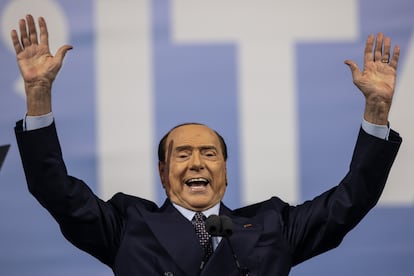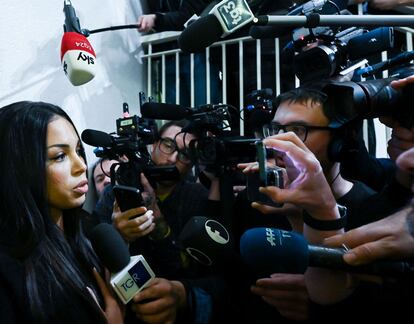The 1,000 lives of Italy’s Silvio Berlusconi
‘Il Cavaliere’ has received another favorable court ruling in connection with his ‘bunga bunga’ sex parties, but he is facing a political storm over his views on the Ukraine war

Silvio Berlusconi always bounces back. The owner of broadcasting giant Mediaset, who has served as Italy’s prime minister on three occasions, is like a Weeble – it is apparently impossible to knock him down. “Il Cavaliere,” now 86, has demonstrated a special talent as a political roly-poly figure, as well as a financial one. But above all, in his judicial dealings, where he has faced over 40 trials with first-instance convictions for soliciting minors for sex and corruption, but has only ever been sentenced for tax fraud. Last week, in the middle of a political storm caused by his criticism of Ukrainian President Volodymyr Zelenskiy, it appeared as though Berlusconi’s luck had finally run out. More than 30 witnesses and compelling evidence were pushing him towards a conviction for buying the silence of participants at his infamous “bunga bunga” sex parties at Berlusconi’s Arcore mansion. But once again, Il Cavaliere swung back upright with his usual smile. “Thanks to these independent judges,” he said, after a year of slinging mud at the Italian judiciary. A fresh problem, however, came on another front.
Berlusconi is now vegetarian, has seven dogs and a 33-year-old girlfriend – Forza Italia lawmaker Marta Fascina – and a long list of health issues that almost cost him his life. But he remains on his feet. Not for nothing did his doctor describe Berlusconi as immortal a few years ago. He has never ceased to be a determining figure in Italian politics. The fundamental change though is that Forza Italia, the party he set up in 1994 and which still represents the European People’s Party (EPP) in Italy, has become a residual formation whose life expectancy is linked to the health of its founder. The issue is that, over the course of 30 years, Berlusconi has resisted naming a successor who would allow the party to function normally. In today’s political climate, the only way to make a difference as a minority partner in the coalition that governs Italy is to rock the boat of Prime Minister Giorgia Meloni.
Berlusconi, who in theory represented the moderate, pro-European component of the center-right coalition that currently governs with far-right undertones (Forza Italia forms a coalition with Matteo Salvini’s Northern League and Meloni’s Brothers of Italy), has found in the war in Ukraine a perfect weapon to use against the government, of which he is a member, when he does not feel he is being listened to. On February 12, after going to the polling station to vote in the regional elections in Lombardy, he was asked by journalists about the meeting held in Paris between French President Emmanuel Macron, German Chancellor Olaf Scholz, and Zelenskiy. Meloni, to her annoyance, had been excluded. Reporters asked if Il Cavaliere would have attended the meeting. “Myself, if I was Prime Minister, I never would have met Zelenskiy,” Berlusconi replied. “Because, as you know, we are witnessing the devastation of his country and the massacre of his soldiers and his people.”

Berlusconi, whose maintains a close friendship with Vladimir Putin, also called on Zelenskiy to seek a peaceful end to the war, ignoring the fact that his country has been invaded by Russia, and said that Washington should stop providing military and financial support to Kyiv while offering his own solution to the conflict: the United States offering a “Marshall Plan of $6 billion, $7 billion, $8 billion or $9 billion” in exchange for a unilateral cease-fire on the part of Kyiv.
The EPP has always tended to look the other way when Berlusconi delivers one of his outbursts. Last September its president, German politician Manfred Weber, justified its alliance with Forza Italia, an unprecedented occurrence in other European countries. But Berlusconi’s unwavering support for Putin provided a turning point that resulted in fierce criticism from the leftist bloc in the European Parliament - which, surprisingly, was applauded by Weber. Two days later, the EPP canceled a European congress that was scheduled to be held in Naples. “Following the remarks by Silvio Berlusconi on Ukraine we decided to cancel our study days in Naples. Support for Ukraine is not optional,” Weber stated on Twitter.
This rift could become a major problem in the coming months: Weber has already approached Meloni several times and the Northern League has long dreamed of abandoning the right-wing eurosceptics in Brussels, who have lost popularity in Italy. “Forza Italia has long since ceased to represent a moderate, liberal and pro-Europe center-right. The fall of Mario Draghi, for which Berlusconi was directly responsible, was the first warning. His outbursts over Ukraine only serve to confirm what this political formation has always been: another of his private enterprises,” says a former Forza Italia minister.
The EPP in Brussels is relying on Antonio Tajani, Italy’s Minister of Foreign Affairs and a former president of the European Parliament, to maintain the relationship with Forza Italia, with the goal of isolating Berlusconi. “Antonio Tajani and Forza Italia have our support and we continue our cooperation with the Italian government on EU issues,” Weber said.
But Forza Italia, through those most loyal to Il Cavaliere, is now attacking the EPP and claims that Weber’s comments are unacceptable. Everything now points to the EPP having to seek new interlocutors in Italy if it wants to maintain the same line as in the rest of Europe: especially if Berlusconi, as he has done so far, continues to bounce back every time he seems to fall down.
Sign up for our weekly newsletter to get more English-language news coverage from EL PAÍS USA Edition
Tu suscripción se está usando en otro dispositivo
¿Quieres añadir otro usuario a tu suscripción?
Si continúas leyendo en este dispositivo, no se podrá leer en el otro.
FlechaTu suscripción se está usando en otro dispositivo y solo puedes acceder a EL PAÍS desde un dispositivo a la vez.
Si quieres compartir tu cuenta, cambia tu suscripción a la modalidad Premium, así podrás añadir otro usuario. Cada uno accederá con su propia cuenta de email, lo que os permitirá personalizar vuestra experiencia en EL PAÍS.
¿Tienes una suscripción de empresa? Accede aquí para contratar más cuentas.
En el caso de no saber quién está usando tu cuenta, te recomendamos cambiar tu contraseña aquí.
Si decides continuar compartiendo tu cuenta, este mensaje se mostrará en tu dispositivo y en el de la otra persona que está usando tu cuenta de forma indefinida, afectando a tu experiencia de lectura. Puedes consultar aquí los términos y condiciones de la suscripción digital.









































